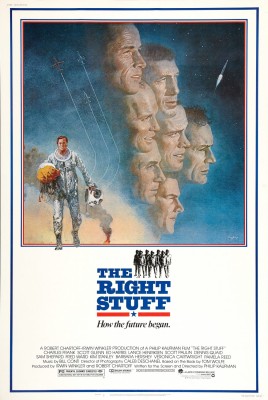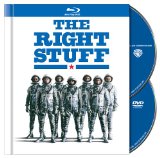| Reviews & Columns |
|
Reviews DVD TV on DVD Blu-ray 4K UHD International DVDs In Theaters Reviews by Studio Video Games Features Collector Series DVDs Easter Egg Database Interviews DVD Talk Radio Feature Articles Columns Anime Talk DVD Savant Horror DVDs The M.O.D. Squad Art House HD Talk Silent DVD
|
DVD Talk Forum |
|
|
| Resources |
|
DVD Price Search Customer Service #'s RCE Info Links |
|
Columns
|
|
|
Right Stuff, The
As I've been saying for years, The Right Stuff (1983) is the best American movie of the 1980s.* Based on Tom Wolfe's book and adapted and directed by Philip Kaufman, the movie essentially tells two stories: Chuck Yeager's exploits as a test pilot, in particular his attempt to break and go beyond the sound barrier; and the earliest days of NASA, as seen through the eyes of its seven Mercury Program astronauts (and their wives).
The material is by itself compelling, but what makes The Right Stuff so special is in the telling. It tells its familiar story of heroic American pioneers in unusual and unexpected ways. Some see The Right Stuff as a modern variation of John Ford's last masterpiece, The Man Who Shot Liberty Valance (1962), an apt comparison.
In Ford's film, a cowboy and gunfighter emblematic of the Old West, played by John Wayne, essentially steps aside so that an aspiring attorney, James Stewart, symbolizing a tamer, civilized West, can take his place. The lawyer becomes a celebrated political figure while the once-famous gunfighter dies in total anonymity, completely forgotten except by his closest friends. In The Right Stuff Chuck Yeager (Sam Shepard) is the Wayne character (even if Shepard plays him like Gary Cooper), while the seven Mercury astronauts are Stewart's. The great irony, of course, is that in 2013 all but one of the seven Mercury astronauts are gone, while Yeager, 90 years old as I write this, was still flying as recently as last year.
The Right Stuff is a truly majestic film, in some ways it's the last great movie epic with, among other things, the subsequent CGI revolution and Ron Howard's obscenely-overrated Apollo 13 making not the slightest dent in its lasting impact. It simultaneously satirizes Cold War politics and mass media hyperbole with its prefabricated American heroes yet, almost indescribably, this only serves to make each act of personal bravery all the more awe-inspiring. In a way, the Mercury astronauts are also Wayne's character, outwardly enjoying the benefits and pitfalls of celebrity, with the public oblivious to or simply not interested in their genuine but mostly private and personal heroism.
When The Right Stuff was new, it was a foregone conclusion a) that the movie would be a colossal success, and b) that it might very well tip the scales, propelling Mercury astronaut-turned-U.S. Senator John Glenn into the White House. Neither happened. Glenn's presidential campaign didn't get very far, and the $27 million movie grossed only about $21 million, thus initially losing a fortune. There was even public backlash from some of the original astronauts, who objected to the satirical elements and the film's dramatic licenses. Yet, it was among the first movies to flop in theaters only to be rediscovered by audiences on home video and via cable television airings.
The Blu-ray has been among the most anticipated releases of the last few years, and from a technical standpoint it does not disappoint, offering a near-perfect video presentation supported by spectacularly good audio. There are numerous extra features, though nearly all are ported over from a 2003 DVD release.
The film begins in 1947, where at Muroc Army Air Field in the California desert Capt. Chuck Yeager and other test pilots work in an environment both futuristic (the experimental aircraft) and like the Old West: Yeager and his wife, Glennis (Barbara Hershey) ride horses and everyone hangs out at the Happy Bottom Riding Club run by Pancho Barnes (a real aviatrix pioneer, played by Kim Stanley**). It's an old-fashioned saloon where the honored dead, pilots who've crashed and burned, are immortalized by having their photographs nailed to the wall. Everyone, especially the wives and girlfriends of the test pilots, dreads a visit from the Minister (Royal Dano), who in the film is like the Angel of Death.
Yeager succeeds in breaking and far exceeding the sound barrier, which attracts hotshot "pudknockers" vying for a shot at eclipsing Yeager's record. When the Russians launch Sputnik in 1957, hysterical American politicians, led by Senator Lyndon B. Johnson (Brit Donald Moffat, in a marvelous performance that should have won him an Oscar), scramble to get a man into orbit and take the lead in the Space Race. Yeager, the best pilot, doesn't fit the profile. The government wants clean-cut college graduates and eventually John Glenn (Ed Harris), "Gus" Grissom (Fred Ward), Gordon Cooper (Dennis Quaid), Alan Shepard (Scott Glenn), Walter Schirra (Lance Henriksen), "Deke" Slayton (Scott Paulin), and Scott Carpenter (Charles Frank) are selected as the Mercury Seven.
The astronauts become the center of a government-fueled media circus, with the men celebrated as national heroes and symbols of American exceptionalism before they've even done anything. Except for media-savvy Glenn, initially they are awkward in dealing with the press though they quickly adapt and bask in their sudden celebrity, benefiting financially via a lucrative deal with Life magazine (John Dehner, in one of his last roles, has an amusing scene as Henry Luce). Some have extramarital affairs, and a few find other ways to exploit their fame. This raises the ire of "Dudley Do-Right" Glenn, an image-conscious pilot who comes across as a real stick-in-the-mud until his devotion to wife Annie (Mary Jo Deschanel, wife of cinematographer Caleb), crippled with a severe speech impediment, is revealed in a tender scene of the two of them alone, at home.
Ultimately though, each man proves up to the task, and when his time comes invariably gives "100% percent." Later each discovers that their fame is fleeting. Yeager, meanwhile, concerned only with "pushing the envelope" and personal achievement, comes to admire the bravery of the Mercury Seven, men he'd previously likened to lab rats. His interests turn from going faster than any man alive to reaching for the stars, implicitly briefly regretting being left behind. In the film's incomparably beautiful climax, one of the greatest sequences in all of cinema, the astronauts are welcomed by Vice President Johnson at Sam Houston Coliseum (near the new Manned Space Center), where they watch Sally Rand perform her famous ostrich feather fan dance, intercut with Yeager's unsuccessful attempt to set a new altitude record at the edge of space. As Yeager's Lockheed NF-104A runs out of air and can't restart, causing a flat spin, back in Houston the astronauts, oblivious to the pomp and circumstance all around them, are through the aging dancer's graceful, bird-like movements reminded of their unique brotherhood, that they've all experienced what no one else can ever fully understand.
The film is superb on many levels. Criticism of the voracious yet gullible press, as frenetic as Keystone Kops, is hilarious and spot-on at once: Kaufman hired Fratelli Bologna, an improv troupe, to play them. Further harkening back to classic comedy, Jeff Goldblum and Harry Shearer portray the Laurel & Hardy-like NASA recruiters, who like Stan & Ollie get their jackets mixed-up at one point and provide bumbling, satirical relief. The astronauts' wives (played by, among others, Veronica Cartwright, the always-underrated Pamela Reed, and Kathy Baker) suffer in silence, proudly standing behind their husbands but never knowing if he'll come home alive each day.
Since its original theatrical run I've probably seen The Right Stuff at least 20 times yet find something new with each viewing. Here I was surprised to notice that O-Lan Jones (then the wife of Sam Shepard), appearing in early scenes at Pancho's crudely trying to pick up Yeager and others, turns up as a mourning widow (with child) in one of the later John Ford-like funeral scenes.
Video & Audio
The Right Stuff looks terrific on Blu-ray, the 1.85:1 1080p image seamlessly blending NASA and test pilot stock footage with models and full-size mock-ups. The special effects for the outer space scenes, expressionistic by design, deliberately avoids photo-realism some of the time. Ironically, that's actually aided The Right Stuff's timelessness versus the early, now dated CGI work later done for Apollo 13. The lossless Dolby TrueHD audio is essentially perfect, with everything from Bill Conti's score (a mix of rousing original music and classical excerpts, owing to his last-minute replacing of John Barry) to the roar of jet aircraft and launch vehicles giving the surround speakers a real workout. Dolby Digital 5.1 mixes are also offered in French, Spanish, German, Italian, Portuguese, and Japanese (the latter two in mono only) with subtitle options in those languages. The disc is region-free.
Extra Features
Supplements consist mainly of nothing more or less than the duplicate copy of the second DVD special features disc that accompanied The Right Stuff's 20th anniversary DVD. That disc includes two 25-minute commentary tracks divided between the cast (Quaid, Reed, Ward, Moffat, Cartwright, Goldblum, Shearer, Moffat, and David Clennon, who plays a government liaison man), and crew (Kaufman, producers Irwin Winkler and Robert Chartoff, Conti, DP Deschanel, and SPFX supervisor Ken Pepiot); three featurettes, totaling about 50 minutes; 10 minutes of deleted scenes; a theatrical trailer; and an "Interactive Timeline to Space," featuring NASA footage and narration by musician Levon Helm, who plays pilot Jack Ridley in the movie and also narrates.
The most valuable extra is a PBS documentary from 1998, John Glenn: American Hero, which brings Glenn's story up-to-date, when he returned to outer space aboard the Space Shuttle Discovery while still in the Senate.
New to the Blu-ray edition is a brief but warm letter from Kaufman and a colorfully illustrated but thin-on-content booklet.
Parting Thoughts
One of the all-time great American films, telling a now sadly distant story of an American space program and its indelible heroes, talented and brave yet also ordinary men reaching for the stars. A DVD Talk Collector Series title.
* For the record, the other best American films of the decade are The Shining (1980), Modern Romance (1981), One from the Heart (1981), The Verdict (1982), The King of Comedy (1983), The Times of Harvey Milk (1984), The Dead (1987), Housekeeping (1987), and The Naked Gun (1988).
** Her performance recalls the hardened pioneering women from classic Westerns, especially Hope Emerson's character from Westward the Women (1951).
Stuart Galbraith IV is a Kyoto-based film historian whose work includes film history books, DVD and Blu-ray audio commentaries and special features. Visit Stuart's Cine Blogarama here.
|
| Popular Reviews |
| Sponsored Links |
|
|
| Sponsored Links |
|
|
| Release List | Reviews | Shop | Newsletter | Forum | DVD Giveaways | Blu-Ray | Advertise |
|
Copyright 2024 DVDTalk.com All Rights Reserved. Legal Info, Privacy Policy, Terms of Use,
Manage Preferences,
Your Privacy Choices | |||||||













